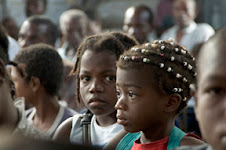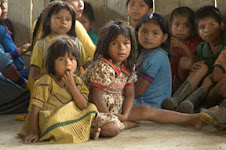Security and Repression
I have to write something that’s very difficult. Not only because it’s terribly painful—indeed, it’s heartbreaking. But also because I have to speak in general terms, without citing names and dates, and certainly, without pictures. You’ll understand, I’m sure…
The Uribe government is eager to claim that its policy of “democratic security” has been a success. And to some extent, as I’ve mentioned before, that seems to be true; at least it’s certainly the case that traveling between the major cities is much safer than it used to be. Previously, I asked the question, “What price security?”, and I think the question still stands. But we can go a little further, and look at people for whom five years of Uribism has not even brought real security.
In the rural communities in many places in Colombia, and this is certainly true in El Chocó, the three armed groups—the guerrillas, the paramilitaries, and the public security forces (military and police) continue do terrible damage, killing, kidnapping and disappearing people, driving people from their homes and lands, destroying the social fabric, and maintaining an atmosphere of fear and insecurity. This is not security.
In the same communities, the army enters and insists on staying in community buildings and even in private houses. This is illegal, as well it should be, but it’s also very dangerous for the people involved, who become targets when the guerrilla forces return. This happens whenever one of the armed groups enters a community, always against the protests of the residents. This is not security.
The so-called “demobilized” paramilitaries, under no serious obligation to compensate, repay or even reconcile with their victims, are essentially offered impunity for their previous barbarities under the terms of the so-called “Race and Justice” law, and the structures created to “reinsert” them. This is not security.
One of my activities is translating documents, and on a regular basis I translate another denunciation of a human rights atrocity by one of the three armed groups. This is not security.
And in the cities, in other areas and here in El Chocó while the guerrilla is not very present, or at least not evident, the crimes against the human rights of people in the barrios and occupied lands are committed by the paramilitaries and the public security forces. People are unwilling to talk about this for attribution, and for good reasons—their fears are not exaggerated or unrealistic. This is not security.
I (and many other people) have wondered in the past if people who support Uribe are making an unwise decision, paying for security with an increasing weakening of their rights, and a democracy whose content seems increasingly doubtful. But what about all the people in the communities and the barrios who even under this regime live in fear and anxiety? They don’t even get to buy security at the price of lost democracy…
Seguridad y Represión
Tengo que escribir algo que me cuesta mucho trabajo. No solamente porque es tremendamente doloroso—de hecho, se le parte el corazón a uno. Sino también porque tengo que habar en términos muy generales, sin citar nombres y fechas, y seguramente sin fotos. Confío que van a entender…
El gobierno de Uribe tiene mucho afán en proclamar que su política de “seguridad democrática” ha sido exitosos. Y hasta cierto punto, como he mencionado antes, eso parece ser verdad; por lo menos es cierto que viajar entre las ciudades grandes es mucho meas seguro que era. Antes, puse la pregunta,—¿A qué precio la seguridad?, y creo que la pregunta todavía es válida. Pero podemos ir más allá, y miramos a gente para que cinco años de uribismo ni siquiera ha traido seguridad verdadera.
En las comunidades del campo en muchos lados de Colombia, y seguramente en El Chocó, los tres grupos armados—las guerrillas, los paramilitares, y la fuerza pública (militares y policía), siguen haciendo daños tremendos, matando, secuestrando y desapareciendo a personas, desplazando a la gente de sus casas y tierras, rompiendo el tejido social, y manteniendo un ambiente de miedo y zozobra. Esto no es seguridad.
En las mismas comunidades, el ejército entra y insiste en quedarse en centros públicos y hasta en casa particulares. Esto es ilegal, como bien debe de ser, pero es además muy peligroso para la gente, quien se convierte en blancos cuando vuelve la fuerza guerrillera. Esto pasa cada vez que uno de los grupos armados entra una comunidad, siempre contra los deseos de los habitantes. Esto no es seguridad.
Los llamados paramilitares “desmovilizados”, sin ninguna obligación seria de compensar, rectorar ni siquiera reconciliarse con sus víctimas, esencialmente reciben impunidad por sus barbaridades anteriores bajo los términos de la llamada Ley de Paz y Justicia, y las estructuras creados para su “reinserción. Esto no es seguridad.
Una de mis actividades es el traducir documentos, y muy a menudo traduzco otra denuncia de una atrocidad contra los derechos humanos de parte de uno de los tres grupos armados. Esto no es seguridad.
Y en las ciudades, en otras zonas y acá en El Chocó mientras la guerrilla no es muy presente, o por lo menos no evidente, los crímenes contra los derechos humanos de gente en los barrios y praderas invadidas son de parte de los paramilitares y las fuerzas públicas. La gente no quiere hablar sobre esto si atribuimos las fuentes, y con mucha razón—su miedo no es ni exagerado ni irrealista. Esto no es seguridad.
Yo (junto con mucha otra gente) he preguntado anteriormente si la gente que apoya a Uribe estarán tomando una decisión no muy acertada, comprando su seguridad por una debilidad cada vez mayor de sus derechos y una democracia cuyo contenido parece cada vez más dudoso. Pero, ¿y todo al gente en las comunidades y los barrios que aún bajo este régimen vive en miedo y zozobra? A ellos ni siquiera se les ofrece la posibilidad de comprar seguridad a precio de democracia perdida…
Monday, November 12, 2007
Subscribe to:
Post Comments (Atom)


No comments:
Post a Comment